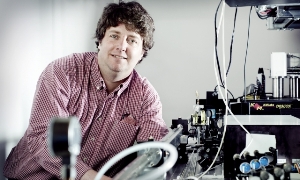Jul 22 2014
François Légaré's team at the INRS Énergie Matériaux Télécommunications Research Centre successfully imaged a chemical reaction with a spatial and temporal resolution greatly exceeding that obtained to date using microscopes.
The team used a femtosecond laser source to shoot a molecular movie of how an acetylene molecule turns into vinylidene. An article presenting the advancement was recently published in the scientific journal Nature Communications.

"The approach we developed combines multiphoton ionization and Coulomb explosion imaging. With the significantly improved resolution of the image, we were able to reveal previously unknown details of this isomerization process and clarify the dynamics of proton migration. This form of imaging uses a compact laser source and is a simple option for studying the ultrafast molecular dynamics of other small organic molecules," said Banting postdoctoral fellow and primary author of the article Heide Ibrahim.
This isomerization process has already been observed using large equipment like free electron lasers with very energetic photons. However, the techniques most commonly employed to track nuclear rearrangement in a molecule were largely insensitive to the subtle and irregular changes that occur during a chemical reaction.
The experiments were designed by postdoctoral fellow Heide Ibrahim and professor François Légaré and conducted at INRS's Advanced Laser Light Source (ALLS) laboratory (Laboratoire de sources femtosecondes) in collaboration with the University of Waterloo, the National Research Council of Canada, and Université de Sherbrooke. The results showed for the first time that multiple oscillations can occur between the two isomers acetylene and vinylidene.